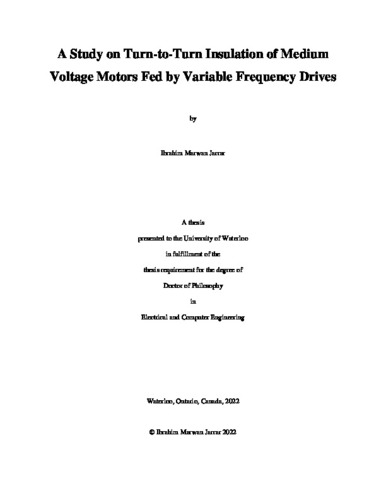| dc.contributor.author | Jarrar, Ibrahim | |
| dc.date.accessioned | 2022-12-20 13:38:32 (GMT) | |
| dc.date.available | 2023-04-20 04:50:07 (GMT) | |
| dc.date.issued | 2022-12-20 | |
| dc.date.submitted | 2022-12-12 | |
| dc.identifier.uri | http://hdl.handle.net/10012/18967 | |
| dc.description.abstract | The use of inverter drives in machine applications is expanding rapidly due to their advantages in terms of energy savings and speed control. Advances in the inverter drive industry have made it possible for inverter drives to be used in medium and high voltage applications. The pulse width modulation (PWM) approach, which is often employed in motor inverter drives, is one of the most popular techniques used to generate the output waveform. Unlike AC-fed machines, the voltage waveform generated through PWM is comprised of multi-width square shape impulses of short rise time and high repetition rate to generate the final AC voltage at the targeted fundamental frequency. The downside is that these drives cause extra stresses on machine insulation that AC-fed machines do not experience. These inherited stresses that accompany the PWM waveform accelerate the ageing of machine insulation and have led to premature failures. As a result, recognizing these stresses is critical for evaluating the endurance of machines turn insulation.
In this research, therefore, the impact of the waveform switching frequency, overshoot and rise time on the time-to-failure and the endurance of Type II machine insulation is investigated. Reference life curves at 1 kHz and 4 kHz are derived utilizing unipolar repetitive square-impulses of 15% overshoot and 300 ns rise time. The effects of the impulse overshoot and rise time in the ranges of 0% to 30% and 400 ns to 1000 ns are also evaluated and reflected on the established reference life plots. Moreover, an antenna-based partial discharge (PD) measurement system is utilized to record and investigate the significant factors affecting the life performance of the insulation systems. Two types of samples are used in this work; a back-to-back turn insulation sample and a single cavity layered insulation. The influence of varying the switching frequency, the rise time, and the overshoot components on the characteristics of the PDs during ageing are investigated to identify the effect of each factor while relating their influence on the life of turn insulation. The interaction between these factors is highlighted and examined utilizing the design of experiment principles. Finite element method simulation using COMSOL® Multiphysics is also utilized to explain and support the experimental findings and to suggest and describe the ageing and failure mechanism associated with the test samples.
Based on the endurance test results, the analysis of PD measurements, and the reported time-to-failure data, it is evident that turn insulation is subjected to additional stress factors when energized by an inverter supply as opposed to the stresses exhibited by sinusoidal waves. This indicates an
v
incomparable ageing rate between the two types of waveforms, even at similar peak voltages applied, resulting in inadequate use of sinusoidal supply to qualify inverter-fed machines. The overshoot component of the waveform is found to have a substantial impact on the endurance of turn insulation apart from the jump voltage impact, and therefore, is identified as a significant factor influencing the life of turn insulation independent from other factors. Moreover, the reported results of the time-to-failure analysis and the PD measurements advocate a non-linear relationship between the switching frequency and the life of turn insulation, whereas the waveform rise time is found to have a negligible but consistent impact within the considered range. | en |
| dc.language.iso | en | en |
| dc.publisher | University of Waterloo | en |
| dc.subject | ageing | en |
| dc.subject | machine insulation | en |
| dc.subject | IEC 60034-18-42 | en |
| dc.subject | switching frequency | en |
| dc.subject | overshoot | en |
| dc.subject | rise time | en |
| dc.subject | variable frequency drives | en |
| dc.subject | voltage source converter | en |
| dc.subject | partial discharge | en |
| dc.subject | design of experiment | en |
| dc.subject | turn insulation | en |
| dc.subject | type II insulation | en |
| dc.subject | jump voltage | en |
| dc.subject | life curve | en |
| dc.subject | voltage endurance testing | en |
| dc.subject | tracking | en |
| dc.subject | time-to-failure | en |
| dc.subject | high voltage testing and qualification | en |
| dc.subject | inverter drives | en |
| dc.subject | Weibull analysis | en |
| dc.subject | life data analysis | en |
| dc.title | A Study on Turn-to-Turn Insulation of Medium Voltage Motors Fed by Variable Frequency Drives | en |
| dc.type | Doctoral Thesis | en |
| dc.pending | false | |
| uws-etd.degree.department | Electrical and Computer Engineering | en |
| uws-etd.degree.discipline | Electrical and Computer Engineering | en |
| uws-etd.degree.grantor | University of Waterloo | en |
| uws-etd.degree | Doctor of Philosophy | en |
| uws-etd.embargo.terms | 4 months | en |
| uws.contributor.advisor | Jayaram, Shesha | |
| uws.contributor.advisor | Cherney, Edward | |
| uws.contributor.affiliation1 | Faculty of Engineering | en |
| uws.published.city | Waterloo | en |
| uws.published.country | Canada | en |
| uws.published.province | Ontario | en |
| uws.typeOfResource | Text | en |
| uws.peerReviewStatus | Unreviewed | en |
| uws.scholarLevel | Graduate | en |

